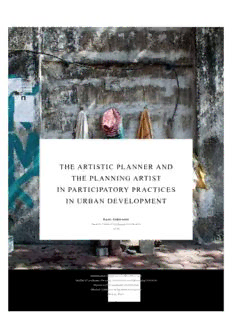Table Of ContentThe arTisTic planner and
The planning arTisT
in parTicipaTory pracTices
in urban developmenT
Karin Andersson
Master’s Thesis of Landscape Architecture
30 hp
Självständigt arbete vid LTJ-fakulteten, SLU
Faculty of Landscape Planning, Horticulture and Agricultural Sciences
Department of La1n /d 7s8cape Architecture
Swedish University of Agricultural Sciences
Alnarp, 2012
2 / 78
The arTisTic planner and
The planning arTisT
in parTicipaTory pracTices
in urban developmenT
EX0546 Master Project in Landscape Architecture, 30 hp, within the Master
Program of Landscape Architecture, Faculty of Landscape Planning, Horticulture and
Agricultural Sciences, Department of Landscape Architecture, Swedish University of
Agricultural Sciences, SLU
Självständigt arbete vid LTJ-fakulteten, SLU, Sveriges lantbruksuniversitet
Title in English:
The artistic planner and the planning artist
in participatory practices in urban development
Title in Swedish:
Den konstnärliga planeraren och den planerande konstnären
i medverkande praktiker i stadsutveckling.
Level: A2E
Supervisors:
Associate Prof Gunilla Lindholm, Faculty of Landscape Planning, Horticulture and
Agricultural Sciences, Swedish University of Agricultural Sciences, Alnarp
Prof Maria Hellström Reimer, Swedish Design Faculty for Design Research and
Research Education, Malmö University, School of Arts and Communication, Malmö
Principal examiner: Eva Gustavsson
Assistant examiner: Marie Larsson
Faculty of Landscape Planning, Horticulture and Agricultural Sciences, Swedish
University of Agricultural Sciences, Alnarp
Keywords:
urban development, India, art, planning, participation, collaboration
All photos are taken by the author.
© Karin Andersson
Alnarp 2012
3 / 78
conTenT
ConTEnT 4
AbSTRACT 8
SAMMAnFATTnInG 9
InTRoDUCTIon 11
AIM 15
MAIn qUESTIonS 16
ConDITIonS AnD LIMITATIonS 17
CoLLAboRATIon AnD PARTICIPATIon - RooTS 18
METHoDoLoGICAL ConSIDERATIonS 19
Case studies 19
Interviews 20
Literature studies 20
DISPoSITIon 22
Part one: Points of departure 22
Part two: Discourses towards a meeting point 23
Part three: Returning to point of departure with discursive awareness 24
PART onE: PoInTS oF DEPARTURE 27
THE URbAn TyPHoon WoRKSHoP In KHIRKEE 28
Delhi 28
Khirkee village and its extension 29
Khoj International Artists’ Association 31
4 / 78
Urbz 31
The Urban Typhoon workshop 32
Urban Typhoon Khirkee, november 2010 33
THE WALL PRoJECT 42
Mumbai 42
organisation of The Wall Project 43
Execution of The Wall Project 44
PART TWo: DISCoURSES ToWARDS A MEETInG PoInT 55
PUbLIC ART 56
From piece to process 56
Collaborative art 57
URbAn PLAnnInG DEvELoPMEnT 62
From art to discourse 62
The communicative turn 63
Cultural planning and city branding 64
The institutionalist approach 65
PART THREE: RETURnInG T o PoInT oF DEPARTURE
WITH DISCURSIvE AWAREnESS 69
Citizen involvement 70
Lack of long-term engagement 71
Cultural authority 73
5 / 78
Division of power 74
Artist and planner in a hybrid 75
Counterpublics 76
ToWARDS A ConCLUSIon 77
The public space and the production of space 77
Third ways 77
Citizen, artist and planner 78
REFEREnCES 81
UnPRInTED SoURCES 82
Interviews 82
Electronic sources 82
PRInTED SoURCES 83
6 / 78
7 / 78
absTracT
A brush of paint on a grey compound wall can mean so much more than simply an addition of colour. It can mean
an appropriation of public space, a shared public space enclosed by a wall now ‘owned’ by someone. It can mean
an arisen conflict leading to debate about the right to use public space.
The Wall Project is a Mumbai based beautification project that uses paint and outdoor walls to brighten up
their city. The Urban Typhoon workshop is an activity set up in self-evolving neighbourhoods where municipal
interference is scarce. During the workshop urban practitioners – such as architects, planners, designers and
foremost artist - from outside are invited to “brainstorm collectively and produce new projections, alternative
visions, ideas and solutions for the neighbourhood”.
In the contemporary discourse of participatory art practices and participatory and collaborative processes in
urban development insights of the two projects above can be gained. Critique raised against both practices are
short-term engagement, tokenism and an authority position seemingly impossible to avoid.
Perhaps a way towards an understanding can be found in hybridity and thoughts of third ways when discussing
participatory and collaborative practices in unequal environments?
Key words: urban development, art, planning, participation, collaboration, India
8 / 78
sammanF aTTning
Ett penseldrag på en grå vägg kan betyda så mycket mer än enbart ett färgstarkt tillägg. Det är ett övertagande
av offentligt rum, ett gemensamt rum inramat av en vägg som nu ”ägs” av någon. Det kan betyda uppkomst av
en konflikt som leder till debatt om rätten till det offentliga rummet.
The Wall Project är ett försköningsprojekt baserat i Mumbai som använder färg och väggar för att göra sin stad
vackrare. The Urban Typhoon workshop utspelar sig i självutvecklande områden där kommunal inblandning är
sällsynt. Under workshopen bjuds urbanister – som arkitekter, planerare, designers och framförallt konstnärer -
utifrån in för att “kollektivt brainstorma och producera nya föreställningar, alternativa visioner, idéer och lösningar
för grannskapet”.
I den samtida diskursen om medverkande och samarbetande konst- och stadsplaneringspraktiker kan förståelse
för de två projekten fås. Kritik som riktas mot båda fälten innefattar kortsiktigt engagemang, skenbart inflytande
och en auktoritär ställning till synes omöjlig att undvika.
Kanske en väg mot förståelse kan hittas i hybriditet och tankar om tredje vägar, när medverkande och
samarbetande praktiker i ojämställda miljöer diskuteras?
Nyckelord: stadsplanering, konst, planering, medverkan, samarbete, Indien
9 / 78
10 / 78
Description:In the contemporary discourse of participatory art practices and participatory and Along with The Wall Project the Urban Typhoon workshop came to be my . constituting landscape architecture is design and planning, one not

